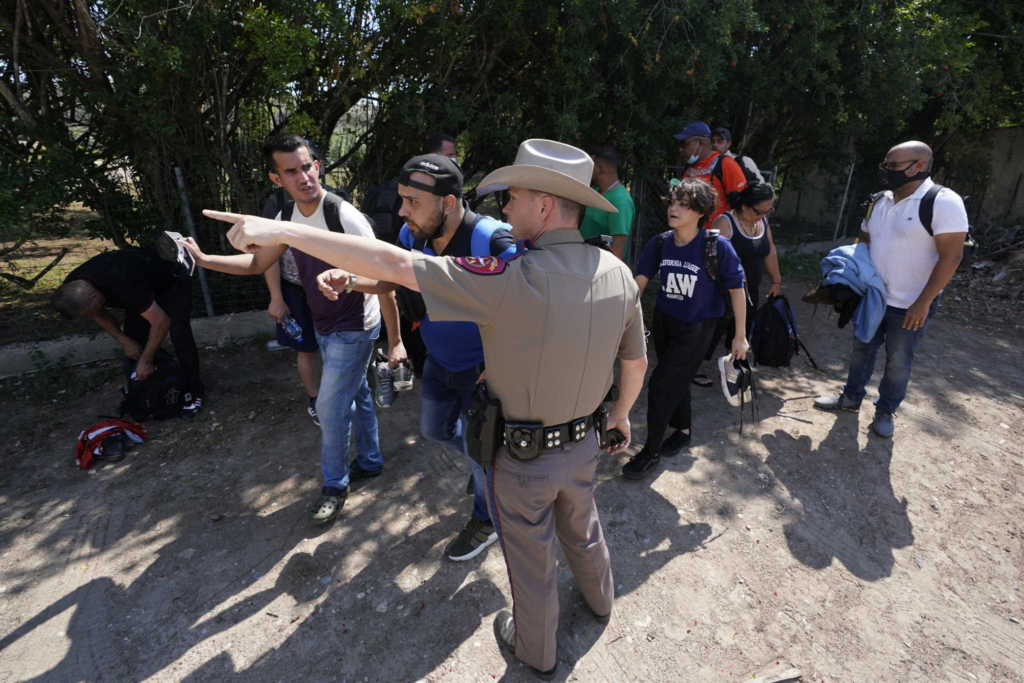
AUSTIN, Texas (AP) — Texas has been actively pushing boundaries on the U.S.- Mexico border for the past two years. This includes actions such as transporting migrants across America, imprisoning a significant number of individuals for trespassing, and installing razor wire along the Rio Grande.
Now, in a recent challenge to the federal government’s authority over immigration, Texas lawmakers have formally approved a bill that grants police the authority to apprehend migrants who enter the country unlawfully. Moreover, local judges will possess the ability to mandate the departure of these individuals from the country.
If this bill is allowed to take effect, it will become one of the strictest immigration laws in the nation. Republican Governor Greg Abbott is expected to sign it. The Mexican government has expressed concerns about potential family separations and racial profiling, criticizing the measure. Furthermore, the bill represents an escalation of Operation Lone Star, the governor’s border scheme, which has been ongoing for nearly three years and costs $10 billion. The state has attempted to use criminal trespassing charges to round up migrants. Prior to the passing of SB 4 in the House on Tuesday evening, another measure for an additional $1.5 billion was also passed, funding Abbott’s spending spree which includes costly border walls, dangerous razor wire, and possibly lethal river buoys.
The Texas Legislature has consistently attempted to influence immigration policy with their own questionable approaches, disregarding the potential harm and consequences faced by individuals who may be impacted, imprisoned, or forcibly removed.
“The Texas Legislature has tried year after year to co-opt immigration policy with its own outlandish schemes, not caring who they may harm, imprison, or forcibly remove in the process,” said Roberto Lopez, an advocacy manager at the Texas
Civil Rights Project, in a statement. “People deserve to be welcomed with dignity and respect, not profiling and arrest.”
According to Priscilla Olivarez, a Policy Attorney and Strategist for the Immigrant Legal Resource Center, it is necessary for all Texans, regardless of their legal status, to express deep concern about this legislation and to urge their elected representatives to vote against it. She argues that the ambiguous language in the bill gives peace officers broad discretion to initiate unwarranted stops solely based on suspicion of someone crossing into Texas from Mexico. As a result, anyone perceived as having crossed the border may be detained and questioned. Olivarez also points out that this measure will disproportionately affect individuals of Brown and Black ethnicities. Additionally, the lack of specific definition for a peace officer suggests that individuals assumed to have law enforcement authority may potentially be able to stop and detain others.
In federal immigration proceedings, individuals have a legal entitlement to due process and the opportunity to present evidence in support of their defense against deportation. This can include establishing legal immigration status, American citizenship, or eligibility for humanitarian protection. Regrettably, the current version of HB 4 does not include these protective measures. Instead, individuals suspected of illegal entry may be deprived of their fundamental rights under both federal immigration law and Texas criminal law. The bill proposes that they can be swiftly deported to Mexico without the chance to seek legal representation.
There is supplementary legislation pertaining to the border that will be deliberated upon by state lawmakers in the upcoming week. On Monday, budget planners in the Texas House will assemble to ponder over the allocation of an additional $1.5 billion for the establishment of a barrier along the state’s border with Mexico. Governor Abbott has integrated this endeavor as part of Operation Lone Star and has emphasized Texas as the sole state endeavoring its own wall construction through recent posts on social media.
During the regular session of the Texas Legislature, which concluded in May, legislators assigned over $5 billion for border security. If sanctioned, the most recent appropriation would be transferred to the governor’s office and provide funding for two years of construction.
The current special legislative session began on October 9th and can extend up to 30 days, although the governor has the authority to call lawmakers back for subsequent sessions.
Reference: https://www.keranews.org/texas-news/2023-10-19/texas lawmakers-to-consider-legislation-allowing-state-and-local-police-to-deport migrants
Submitted by : Jagriti Tiwari , A first year law student at legal Vidya
Disclaimer: The materials provided herein are intended solely for informational purposes. Accessing or using the site or the materials does not establish an attorney-client relationship. The information presented on this site is not to be construed as legal or professional advice, and it should not be relied upon for such purposes or used as a substitute for advice from a licensed attorney in your state. Additionally, the viewpoint presented by the author is of a personal nature.




0 Comments